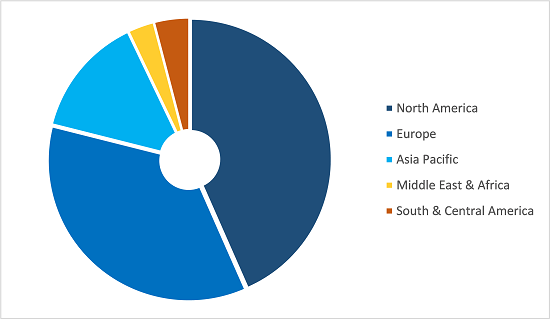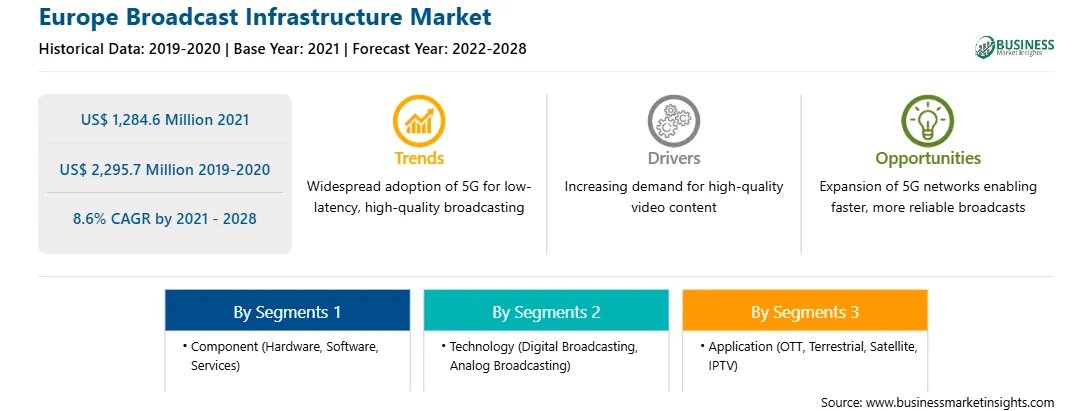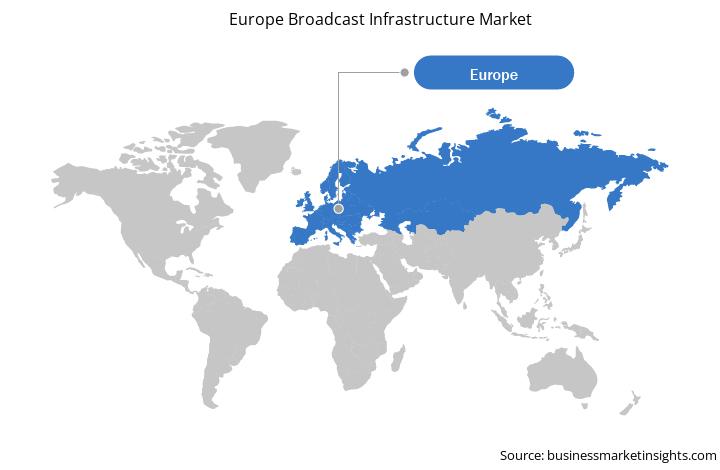Market Introduction
As the OTT trend grows across Europe, the consumption behavior of end users is also evolving. On an average, Europeans began spending 2 hours more on watching video-on-demand (VOD) content in 2019 than in the previous year. According to MUVI, currently, there are 2,536 on-demand video providers in the European Union. The UK, the Netherlands, and Scandinavia have seen the greatest rise in the popularity of OTT platforms over the years. The most frequent type of VOD usage in Western Europe is subscription video-on-demand services (SVOD). OTT SVOD memberships have increased from 300,000 in 2010 to over 140 million in 2020, owing to multiple streaming services that have emerged over the last 10 years and significant consumer uptake in Europe.
The rapid penetration of smartphones has also positively impacted the broadcasting infrastructure market in Europe over the years. As per the trends in broadcasting, mobile viewing has become a regular habit for a considerable proportion of users. In 2020, 46% of users streamed video content on their phones on a daily basis and 27% streamed on a weekly basis. According to the study, mobile streaming viewership in the region increased by 7% in 2019 compared to that in 2018.
Strategic insights for the Europe Broadcast Infrastructure provides data-driven analysis of the industry landscape, including current trends, key players, and regional nuances. These insights offer actionable recommendations, enabling readers to differentiate themselves from competitors by identifying untapped segments or developing unique value propositions. Leveraging data analytics, these insights help industry players anticipate the market shifts, whether investors, manufacturers, or other stakeholders. A future-oriented perspective is essential, helping stakeholders anticipate market shifts and position themselves for long-term success in this dynamic region. Ultimately, effective strategic insights empower readers to make informed decisions that drive profitability and achieve their business objectives within the market. The geographic scope of the Europe Broadcast Infrastructure refers to the specific areas in which a business operates and competes. Understanding local distinctions, such as diverse consumer preferences (e.g., demand for specific plug types or battery backup durations), varying economic conditions, and regulatory environments, is crucial for tailoring strategies to specific markets. Businesses can expand their reach by identifying underserved areas or adapting their offerings to meet local demands. A clear market focus allows for more effective resource allocation, targeted marketing campaigns, and better positioning against local competitors, ultimately driving growth in those targeted areas.
Europe Broadcast Infrastructure Strategic Insights

Europe Broadcast Infrastructure Report Scope
Report Attribute
Details
Market size in 2021
US$ 1,284.6 Million
Market Size by 2028
US$ 2,295.7 Million
Global CAGR (2021 - 2028)
8.6%
Historical Data
2019-2020
Forecast period
2022-2028
Segments Covered
By Component
By Technology
By Application
Regions and Countries Covered
Europe
Market leaders and key company profiles
Europe Broadcast Infrastructure Regional Insights

Market Overview and Dynamics
The Europe broadcast infrastructure market is expected to grow from US$ 1,284.6 million in 2021 to US$ 2,295.7 million by 2028; it is expected to register a CAGR of 8.6% from 2021 to 2028.
Digital Terrestrial TV (DTTV) is an implementation of digital television technology to provide a greater number of channels with better picture and sound quality, using aerial broadcasts. The enthusiasm toward video-on-demand (VOD) services among the population is growing exponentially in today’s fast-paced and technologically advanced world. In Europe, TV is among the most common means of entertainment. Nearly 95% of European households have TVs and the penetration of DTT is expected to grow. With the increasing adoption of TV sets and expenditure on terrestrial networks for video quality, entertainment purpose, the demand for DTT has also boosted.
Key Market Segments
The Europe broadcast infrastructure market is segmented based on component, technology, application, and country. Based on component, the market is subsegmented into hardware, software, and services. The software segment held the largest share of the market in 2021. The demand for scalability, agility, and scalability is triggering the adoption of cloud platforms in the broadcast industry. Increasing demand for video viewing or interacting viewing has led to the approval of cloud-based solutions.
In terms of technology, the broadcast infrastructure market is subsegmented into digital broadcasting and analog broadcasting. In 2021, the digital broadcasting segment held a larger market share. Owing to high-frequency usage, digital broadcasting is capable to transmit several programs in a provided bandwidth when compared with analog broadcasting.
Based on application, the Europe broadcast infrastructure market is subsegmented into OTT, terrestrial, satellite, IPTV, and others. In 2021, the terrestrial segment dominated the broadcast infrastructure market in Europe. The transition to digital terrestrial TV from analog terrestrial TV can be considered a significant development for the broadcasting industry. By country, the broadcast infrastructure market in Europe is segmented into the UK, Russia, Germany, France, and Italy. Germany held the largest market share in Europe broadcast infrastructure market. An increasing number of TV channels and intense competition to enhance channel presentation are the factors providing huge growth opportunities to the players in the German broadcast infrastructure market. In Germany several channel operators have launched valuable programs and platforms to broadcast sports events in last few years.
Major Sources and Companies Listed
A few major primary and secondary sources referred to while preparing the report on the Europe broadcast infrastructure market are company websites, annual reports, financial reports, national government documents, and statistical databases. Cisco Systems, Inc.; Clyde Broadcast Technology; CS Computer Systems Ltd.; Dacast Inc.; EVS Broadcast Equipment SA; Grass Valley; Kaltura; Nevion; Ross Video Ltd; and Broadcasting Center Europe S.A. are among the major companies listed in the market report.
Reasons to Buy Report
Europe Broadcast Infrastructure Market Segmentation
By Application
Company Profiles
The List of Companies - Europe Broadcast Infrastructure Market
The Europe Broadcast Infrastructure Market is valued at US$ 1,284.6 Million in 2021, it is projected to reach US$ 2,295.7 Million by 2028.
As per our report Europe Broadcast Infrastructure Market, the market size is valued at US$ 1,284.6 Million in 2021, projecting it to reach US$ 2,295.7 Million by 2028. This translates to a CAGR of approximately 8.6% during the forecast period.
The Europe Broadcast Infrastructure Market report typically cover these key segments-
The historic period, base year, and forecast period can vary slightly depending on the specific market research report. However, for the Europe Broadcast Infrastructure Market report:
The Europe Broadcast Infrastructure Market is populated by several key players, each contributing to its growth and innovation. Some of the major players include:
The Europe Broadcast Infrastructure Market report is valuable for diverse stakeholders, including:
Essentially, anyone involved in or considering involvement in the Europe Broadcast Infrastructure Market value chain can benefit from the information contained in a comprehensive market report.